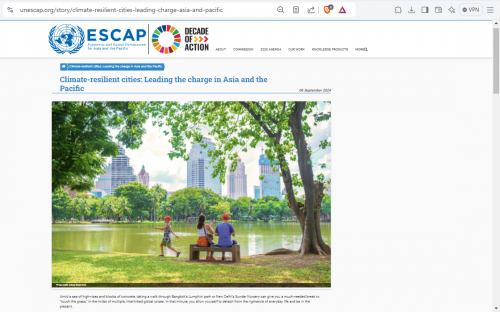Amid a sea of high-rises and blocks of concrete, taking a walk through Bangkok’s Lumphini park or New Delhi’s Sunder Nursery can give you a much-needed break to “touch the grass,” in the midst of multiple, interlinked global crises. In that minute, you allow yourself to detach from the rigmarole of everyday life and be in the present.
But having access to these green spaces is proving to be a luxury in cities across Asia and the Pacific. Response can no longer be limited to the international and national government levels, as the challenge posed by climate change weighs heavy – and this is where cities “enter the chat.”
The Asia-Pacific region is characterized by a diversity of cities, from sprawling metropolises to rapidly growing urban centres. Due to their concentration of population, they are at the forefront of challenges linked to quality of life, resilience and sustainability. Amidst the fast life of packed streets, cramped living spaces, and burgeoning shopping centres, unique climate-related issues rear their heads.
Experts say action to combat these is coming from within urban centres.
"Cities in the region are becoming a lot more climate-conscious," explains Cathy Oke, Director of the Melbourne Centre for Cities. "They are feeling greater impact from climate change, like flooding and air pollution, but they are taking on board ownership to mitigate the situation through energy efficiency, green infrastructure or addressing issues like air quality and the transport system."
Leveraging innovation for climate solutions
From flood mitigation and water sensitive design in Singapore, to increased greening through vertical forests in Kuala Lumpur, and transforming transportation systems to reduce congestion in Bangkok, cities in the Asia-Pacific region are becoming hubs of climate consciousness and innovation. Other initiatives involve renewable energy projects like micro grids and solar farming within urban spaces.
As test beds for exploring how innovation can reshape the global response to climate needs, cities offer a unique opportunity.
“There are so many different ways that the urban fabric can be innovated on both vertically and horizontally. What we're seeing is just this amazing explosion of ideas being tested in the way that cities are being built,” says Alexei Trundle, Associate Director (International), at the Melbourne Centre for Cities.
“The key to Asia and the Pacific is that the amount of city that needs to be built going forward will completely duplicate the amount that is already built. So, there's a huge potential for integrating new technologies as the cities expand across the region,” he adds.













